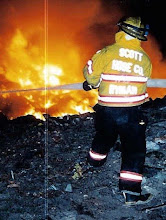The overwrought alliteration shows my disdain. They are everywhere, but they use code words
to describe themselves. I’m “detail
oriented” they say. Never will one
introduce themselves and say, “hi, I’m a micromanager.” Their involvement in every aspect of
operations is necessary, because no one can live up to their expectations.
One chief who was an administrative nightmare to work for
had many of these characteristics. I
called him a “shotgun manager.” He never
met an idea he didn’t like, so there were a hundred projects all in progress at
the same time. Because of this and the
necessity for his involvement in everything—he couldn’t delegate to save his
life—that meant that nothing ever was completed. Since everything was a priority, nothing
was. Luckily, he wasn’t like this on the
fire ground (fire ground micromanagers are even more scary) , and to this
chief’s credit, he eventually evolved, changed, and improved, but that is the
exception with this type of manager, not the rule.
The data collectors are worse. They never met a metric or measurement they
didn’t like. Just because an activity is
quantifiable doesn’t mean it should be.
The argument is that the “workers” only do well what is checked—so these
guys check everything. When we measure
everything, the same shotgun result occurs.
Since everything is a priority, nothing really is.
My contention has long been there are typically four or five
big important things that make an organization successful. Measure and take good care of those, and
everything else—the details—will take care of themselves. I never thought it was rocket science, but
maybe it is. Einstein said “not
everything that can be counted counts, and not everything that counts can be
counted.”



